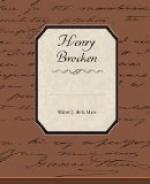It was a strange outburst. His voice rose almost to a chant, full of a forlorn music. But even as he ceased, we heard in the following silence, above the plashing of the restless fountains, beyond, far and faint, a wild and stranger music welling. And I saw from the porch that looks out from the house called Gloom, “La belle Dame sans Merci” pass riding with her train, who rides in beauty beneath the huntress, heedless of disguise. Across from far away, like leaves of autumn, skirred the dappled deer. The music grew, timbrel and pipe and tabor, as beneath the glances of the moon the little company sped, transient as a rainbow, elusive as a dream. I saw her maidens bound and sandalled, with all their everlasting flowers; and advancing soundless, unreal, the silver wheels of that unearthly chariot amid the Fauns. On, on they gamboled, hoof in yielding turf, blowing reed melodies, mocking water, their lips laid sidelong, their eyes aleer along the smoothness of their flutes.
And when I turned again to my companions, with I know not what old folly in my eyes, I know not what unanswerable cry in my heart, Reverie alone was at my side. I seemed to see the long fringes of the lake, the sedge withered, the grey waters restless in the bonds of the wind, tuneless and chill; all these happy gardens swept bare and flowerless; and the far hills silent in the unattainable dawn.
“She pipes, he follows,” said Reverie; “she sets the tune, he dances. Yet, sir, on my soul, I believe it is the childish face of that same Innocence we kept tryst with long ago he pursues on and on, through what sad labyrinths we, who dream not so wildly, cannot by taking thought come to guess.”
* * * * *
The next two days passed serenely and quietly at Reverie’s. We read together, rode, walked, and talked together, and listened in the evening to music. For a sister of Reverie’s lived not far distant, who visited him while I was there, and took supper with us, delighting us with her wit and spirit and her youthful voice.
But though Reverie more than once suggested it, I could not bring myself to return to the “World’s End” and its garrulous company. Whether it was the moist, grey face of Mr. Cruelty I most abhorred, or Stubborn’s slug-like eye, or the tongue-stump of my afflicted guide, I cannot say.
Moreover, I had begun to feel a very keen curiosity to see the way that had lured Christian on with such graceless obstinacy. They had spoken of remorse, poverty, pride, world-failure, even insanity, even vice: but these appeared to me only such things as might fret a man to set violently out on, not to persist in such a course; or likelier yet, to abandon hope, to turn back from heights that trouble or confusion set so far, and made seem dreams.
How could I help, too, being amused to think how vastly strange these fellows considered a man’s venturing whither his star beckoned; though that star were only power, only fame, only beauty, only peace? What wonder they were many?




